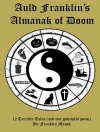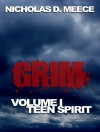In Ambrose Bierce’s haunting short story ‘The Damned Thing, ‘ readers are immersed in a gripping exploration of the unknown, where the boundaries of reality and perception blur. Set against the backdrop of the American West, Bierce employs a vivid descriptive style and a fragmented narrative structure to convey the psychological turmoil of his protagonist. The story delves into themes of isolation, existential dread, and the limits of human understanding, recalling the era’s fascination with naturalism and the supernatural. The titular ‘damned thing’ becomes a symbol of humanity’s struggle to comprehend the incomprehensible, echoing the broader literary traditions of gothic horror and existential inquiry that were gaining prominence in the late 19th century. Bierce, a Civil War veteran and journalist known for his acerbic wit and incisive observations, often wrestled with themes of death and the absurd in his works. His personal experiences, particularly the horrors of war and the tumultuous socio-political climate of his time, profoundly influenced his understanding of fear and the macabre. ‘The Damned Thing’ reflects his unique perspective, showcasing his ability to intertwine personal trauma with universal themes of alienation and the mysteries of existence. Readers intrigued by the delicate balance between horror and psychological introspection will find ‘The Damned Thing’ a compelling addition to their literary repertoire. Bierce’s masterful command of atmosphere and mood offers a reflective journey through the darker aspects of the human condition, making this work essential for those interested in American literature and the exploration of madness and perception.
Об авторе
Ambrose Bierce, an American writer known for his satirical wit and sardonic view of human nature, carved a distinctive niche in the late 19th and early 20th century literary world. Bierce was born on June 24, 1842, in Meigs County, Ohio, and disappeared in mysterious circumstances circa 1914. A prolific writer, journalist, and editorialist, he served in the Union Army during the Civil War, an experience that profoundly shaped his writing and provided rich material for his short stories and memoirs, like the acclaimed ‘An Occurrence at Owl Creek Bridge’ and ‘Tales of Soldiers and Civilians’ (1891). His most celebrated work, however, is ‘The Devil’s Dictionary’ (1906), a lexicon that employs satire to reinterpret various social and political terminologies. ‘The Damned Thing’, one of Bierce’s many short stories, illustrates his mastery in using psychological horror and the supernatural to explore the dark corners of the human experience. Written in a non-linear narrative style, the story delves into the mysterious and unseen forces that can dramatically impact reality, showcasing Bierce’s fascination with the inexplicable. His writing style, marked by a clear, unadorned prose, and a cynicism that highlighted the imperfections of both individuals and society, has left a lasting impression on American literature and on writers who followed, including H. P. Lovecraft and Ernest Hemingway.












